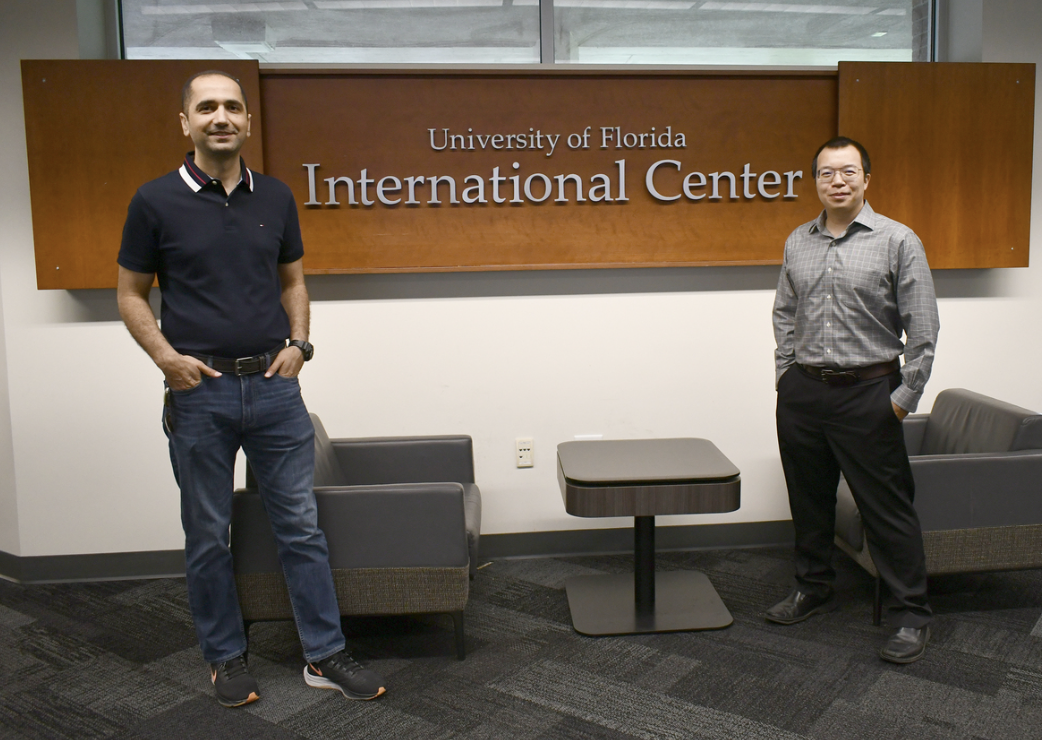Dr. Mohammad Al-Qaralleh (left), and Dr. Michael Jung, OGRE
In Summer of 2021, the International Center hosted four Jordanian Fulbright scholars participating in the Fulbright Junior Faculty Development Program (JFDP), a ten-week intensive program focused on environmental sustainability. The program was developed to enhance scholars’ teaching and research skills, as well as establish long term institutional linkages.
UF was honored to host, once again, one of the scholars from Mutah University in Karak, Jordan, Dr. Mohammad Al-Qaralleh, who returned to the US recently and made a stop in the Gator Nation.
Dr. Al-Qaralleh is an Assistant Professor in the Civil and Environmental Engineering Department at Mutah. His research and expertise are in plastic waste management, use of plastic for flexible pavement and “smart concrete” – concrete infused with an electrical current while it’s being poured. “During this period of time, if you apply an electrical current, it will develop electrical properties,” said Al-Qaralleh, speaking of his research which he replicated from a single Japanese study. After this process, the concrete can “communicate” with engineers, emitting signals when it’s been compressed or stressed, something invaluable in the field of civil engineering.
“My visit here was really inspiring on all levels: personal and academic,” said Mohammad of his time with the JFDP. Since his trip, he and his UF mentor, Dr. Christopher Ferraro (Department of Civil and Coastal Engineering) have finished work on two and published one academic paper. With collaboration from UFIC, he helped establish an international Memorandum of Understanding (MOU) between Mutah University and UF, signed at the beginning of this year. He even used his observations of UF, and particularly the students, to petition his dean to create more open study spaces. “I learned from my visit to UF that students are the core of the education process.” Here, he saw students congregating in many open spaces, developing community, and enriching their college experiences. At Mutah, studying traditionally was relegated to libraries—Mohammad convinced his dean, and recently the sponsorship needed to develop such spaces was secured!
Next for Dr. Al-Qaralleh is continuing to pursue the goal of the JFDP to establish sustainable institutional linkages, possibly in the field of Virtual Exchange. UFIC’s Office of Global Learning has partnerships throughout the world providing all students with opportunities to gain global perspectives and engage in international interactions, and Mohammad sees lots of potential opportunities for enrichment of students of both institutions.
Of all the things Dr. Al-Qarelleh gained in his experience, the thing he returns to the most are connections. In fact, his visit this year was sponsored by the Fulbright subdivision Rawabit. “The name ‘Rawabit’ is an Arabic word that means ‘connections’,” said Al-Qarelleh. Indeed, it was his connections in the US that earned him the grant that allowed for him to return here and visit UF, his alma mater (Western Michigan University), and a few other stops along the way to meet with researchers and colleagues in his field.
“I made friends for life,” said Mohammad. “I am really thankful for the people who took care of us during those two months. This kind of warmth and inviting environment is something that makes you miss the place and the people.” When asked what he missed most, Dr. Al-Qarelleh responded, “The only thing I don’t miss is the humidity!”

